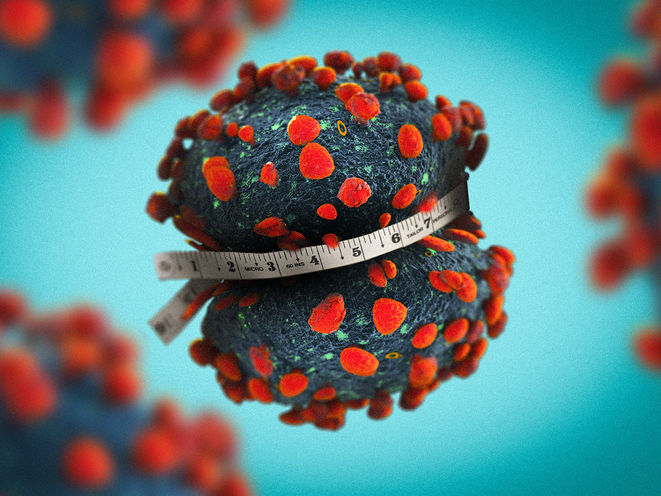Obesity and biological sex may make individuals more vulnerable to COVID-19
Obesity dramatically increases someone’s risk of being hospitalized, placed on a ventilator or dying due to COVID-19
A new animal study from Katherine Lee, a researcher with the West Virginia University School of Medicine, investigates why individuals with obesity may have a particularly difficult time fending off SARS-CoV-2, the virus that causes Covid-19. Specifically, female obese mice experienced worse disease symptoms, showing the importance of both obesity and biological sex in COVID-19 outcomes. Lee’s findings appear in iScience.

A new West Virginia University study suggests obesity may impair the ability to fight off SARS-CoV-2, the virus that causes COVID-19, in a sex-dependent manner.
WVU Illustration/Graham Curry
Obesity dramatically increases someone’s risk of being hospitalized, placed on a ventilator or dying due to COVID-19. Considering that about two out of every five Americans are obese, that risk is far from negligible.
“No human is 100% healthy in every respect,” said Lee, a doctoral student in the Department of Microbiology, Immunology and Cell Biology. “There are always going to be little differences in the way our bodies function and those changes can ultimately affect the ways we respond to everything. So, I think as soon as we start incorporating those differences and changes — metabolic diseases and preexisting conditions — into our work, we can learn more about how vaccines and therapeutics might be more or less effective in these people.”
Lee, her colleague Brynnan Russ, a WVU postdoctoral fellow who co-led the study, and their research partners, exposed two groups of mice to SARS-CoV-2. One group ate a diet designed to induce obesity; the other stuck to a normal diet and maintained a healthy weight.
On average, the mice that developed obesity experienced more severe disease than their counterparts did. They also showed symptoms sooner.
But these disparities were more pronounced in the female mice than in the males. In addition, female mice in the obesity group experienced high viral burdens and the most inflammation in their lungs.
“Clinically, a lot of data shows that men are more predisposed to severe COVID-19 than women,” Lee said. “While we can’t translate our findings from female mice directly to female humans, they do indicate an area for future study. Why does sex play a role in outcomes of COVID-19? And how is obesity a confounding factor?”
Lee’s findings are especially relevant in West Virginia, which has the second-highest rate of obesity in the nation.
They’re also relevant to the development of new vaccines and treatments for COVID-19, as well as other respiratory diseases.
“These mice are a new preclinical model we developed to be used as another tool to measure the protection of vaccines and other therapeutics the Vaccine Development Center has in development,” Lee said. “What we see with SARS-CoV-2 in a host with metabolic disease here is potentially relevant to respiratory pathogens and diseases. Preexisting conditions and comorbidities are going to be really important to consider moving forward.”




















































